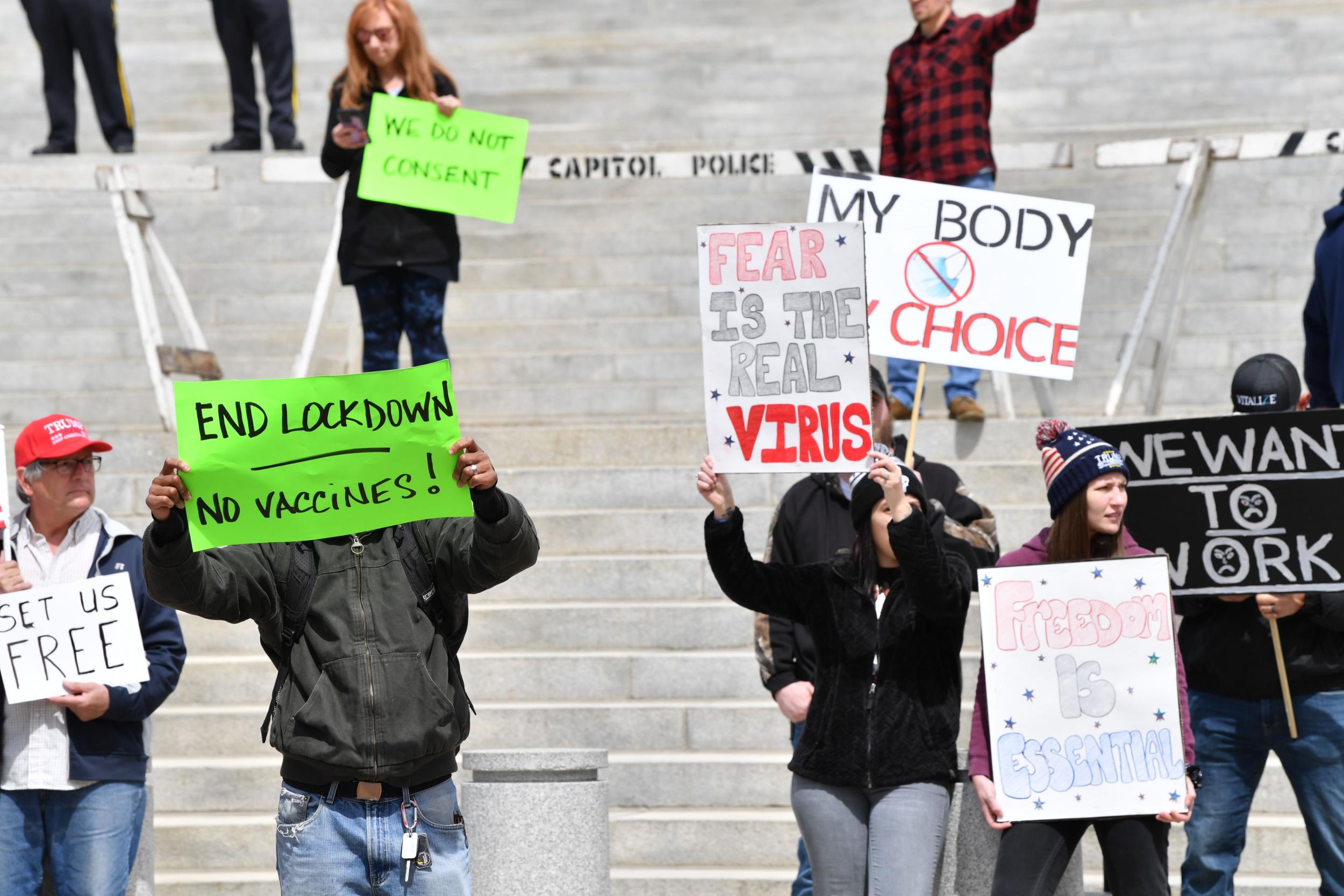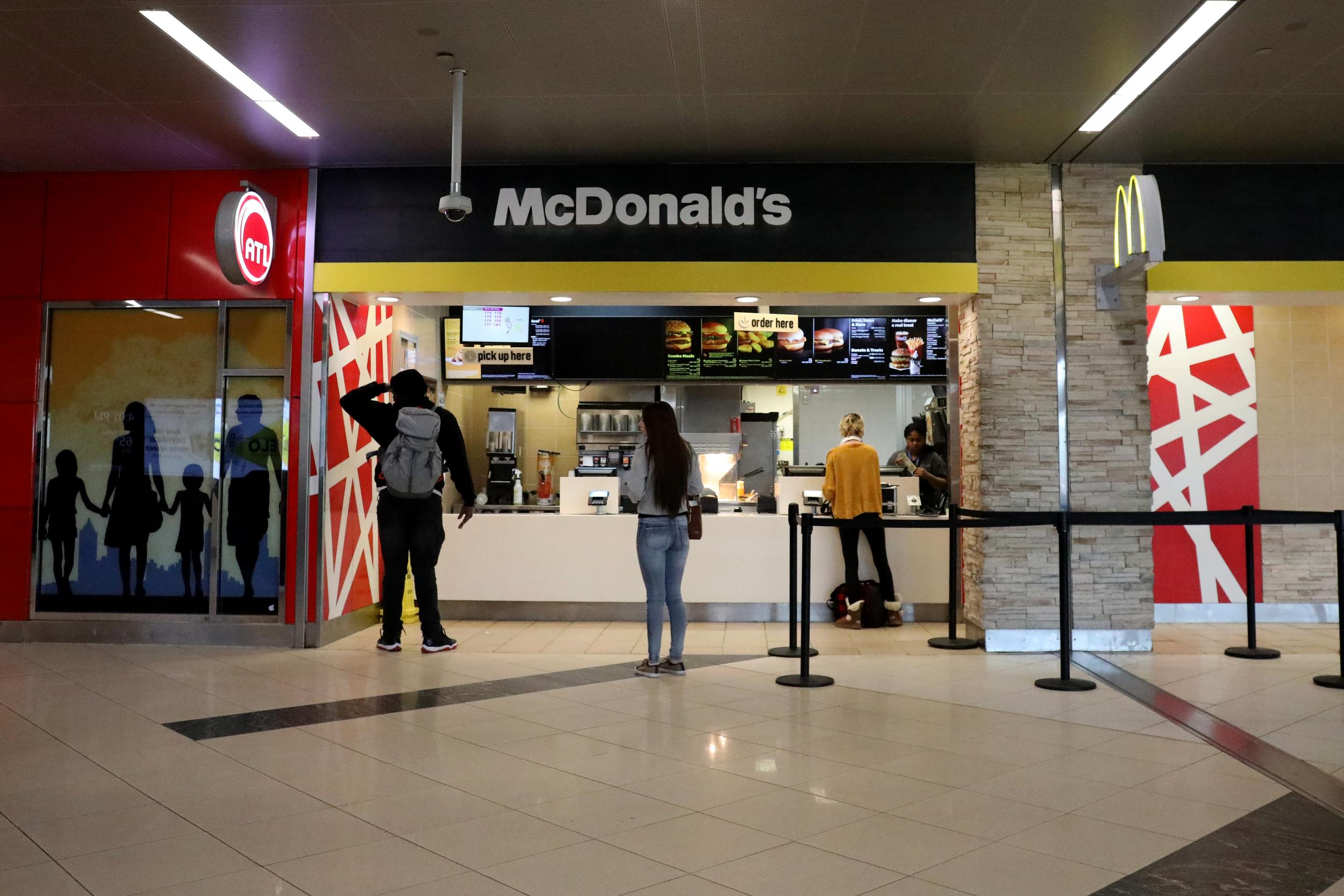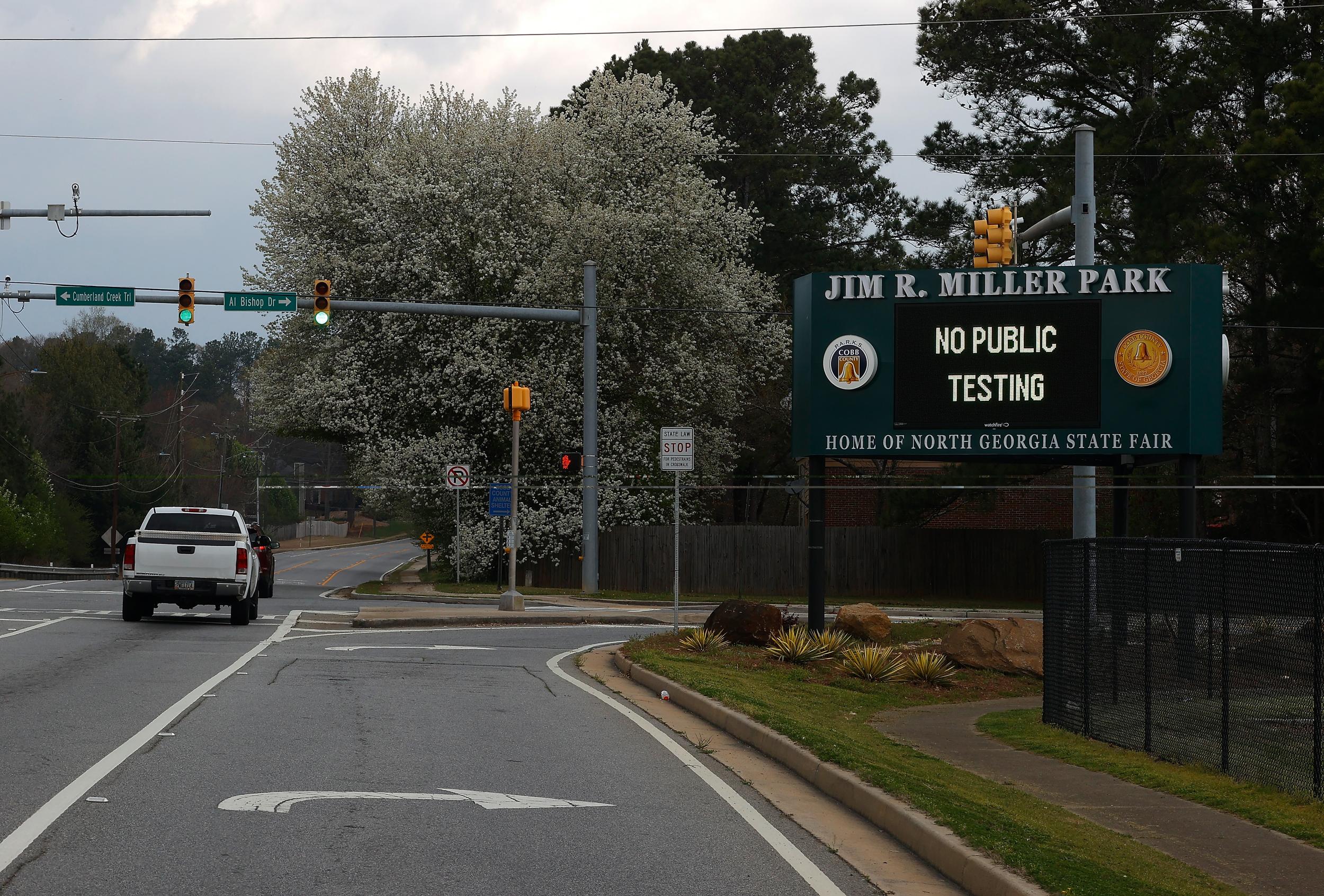‘Beyond disturbed’: Parts of US panic as states reopen despite soaring coronavirus death toll
‘That could be setting us back. It certainly isn’t going to be helpful,’ says Dr Anthony Fauci
Your support helps us to tell the story
From reproductive rights to climate change to Big Tech, The Independent is on the ground when the story is developing. Whether it's investigating the financials of Elon Musk's pro-Trump PAC or producing our latest documentary, 'The A Word', which shines a light on the American women fighting for reproductive rights, we know how important it is to parse out the facts from the messaging.
At such a critical moment in US history, we need reporters on the ground. Your donation allows us to keep sending journalists to speak to both sides of the story.
The Independent is trusted by Americans across the entire political spectrum. And unlike many other quality news outlets, we choose not to lock Americans out of our reporting and analysis with paywalls. We believe quality journalism should be available to everyone, paid for by those who can afford it.
Your support makes all the difference.The decision by Gov. Brian Kemp to begin restarting Georgia’s economy drew swift rebukes Tuesday from mayors, public health experts and some business owners, with sceptics arguing that the plan might amplify another wave of coronavirus outbreaks.
“That could be setting us back,” Dr Anthony Fauci, director of the National Institute of Allergy and Infectious Diseases, said in an interview on Tuesday, referring to Georgia and other states planning to reopen in coming days. “It certainly isn’t going to be helpful.”
Kemp’s decision allows for what he described as a measured return, starting Friday with the reopening of gyms, hair and nail salons, bowling alleys and tattoo parlours. On Monday, restaurants can resume dine-in service, and movie theatres and other entertainment venues can reopen. He also lifted limitations on houses of worship.
But the mayors of Atlanta and other large cities in the state expressed outrage over not having the authority to adjust the governor’s order to the needs of their residents. They vowed to urge Georgians to ignore Kemp’s directive.
“I am beyond disturbed,” Savannah’s mayor, Van Johnson, said on CNN, of the governor’s decision.
Projections show that Georgia hasn't seen the worst of the coronavirus, with deaths not forecast to level off until early May, according to the Institute for Health Metrics and Evaluation. The state has recorded about 19,000 confirmed cases of the virus, with nearly 800 deaths as of Tuesday afternoon, according to state public health data.
But the state, which has a population of 10 million, has also processed some 1.1 million unemployment claims since 14 March, labour officials said, a troubling indication of its collateral economic damage.
“I think this is the right approach at the right time,” Kemp, a Republican, said at a news conference of what he characterised as a cautious approach. “It’s not just throwing the keys back to these business owners.”
For weeks, America’s governors have agonised over balancing urgent action in the form of stay-at-home orders to fight the virus — Georgia’s is set to expire on 30 April — against the catastrophic economic impact of those measures. There have been signs of impatience as unemployment surged, modest protests sprung up around the country and President Donald Trump voiced his own eagerness to restart the economy.
In South Carolina, Gov. Henry McMaster led the pack, relaxing measures and allowing some stores to resume business for the first time Tuesday. But streets were mostly empty in downtown Charleston, and public beaches also reopened to trickling crowds.

Elsewhere across the country, the governors of Tennessee, Ohio and Colorado indicated they would not extend stay-at-home orders that expire next week.
The decision in Georgia has created a dilemma for the owners of businesses that had been especially punished by the shelter-in-place order and have now been given the go-ahead to resume operating. The owners, and their employees, questioned on Tuesday whether restoring their livelihoods outweighs the continued risks posed by the pandemic.
Jeffrey Todd, a hairstylist, said he would not be throwing open the doors of his one-person salon. He called the governor’s decision “reckless”.
“When you are talking about putting people back to work who cannot social distance, it literally makes no sense,” Todd said. “It’s like you are putting us out as the guinea pigs to see what’s going to happen.”
But then there was Tatiana Kalistratova, who also runs a one-person salon in Atlanta. Her boyfriend has been furloughed from his job and she worries about making the $2,400 rent on their apartment in the upscale Buckhead district. She will be seeing her first client for a haircut at 10 am on Friday.

“I am not political,” Kalistratova said. “I personally don’t have savings like so many of us in America. To me, it’s a matter of money.”
Officials and public health experts stressed that while a reopening might bear some resemblance to normalcy, daily life will not be the same as it was just two months ago. Indeed, in Rhode Island, Gov. Gina Raimondo told residents Tuesday to expect forms of social distancing to be in effect for a year, which was in line with the cautious messages coming from health officials.
In a wide-ranging interview with The Washington Post, Dr Robert Redfield, director of the Centres for Disease Control and Prevention, warned that a second wave of the coronavirus is likely to come this winter when it will coincide with the flu. He said that federal and state officials should prepare and that social distancing measures should continue to be stressed as stay-at-home orders are lifted.
“Going back to the past isn’t happening anytime soon,” said Carlos Del Rio, a professor of global health at Emory University in Atlanta, adding that, ultimately, limiting the virus’s spread will depend on people acting responsibly. “It’s not going to be up to the government. It’s going to be up to us as individuals.”
An NBC News/Wall Street Journal poll taken last week found that 58 per cent of American voters said they were more concerned that relaxing stay-at-home restrictions would lead to more deaths than they were that keeping the restrictions would hurt the economy.

“I think it’s because they value life,” said Bishop Reginald Jackson, presiding prelate in Georgia for the African Methodist Episcopal Church. “If you don’t have your life, what good is the job? If you don’t have your life, what good is the dollar?”
Similar concerns are playing out in other states. In Colorado, where Gov. Jared Polis said Tuesday that he would allow his blanket stay-at-home order to evolve into an encouragement to be “safer at home”, these tentative steps have brought a mix of relief, confusion and worry.
“It seems reckless to just open willy-nilly when we have no way of knowing,” said Sherry Larkin, who runs a massage-therapy clinic in Denver.
And on Folly Island outside Charleston, South Carolina, Mayor Tim Goodwin of Folly Beach was struggling with the implications of McMaster’s plan to begin rolling back mandatory closures of nonessential businesses and recreation areas.
On Tuesday, bicyclists far outnumbered cars; usually, on busy days in the spring and summer, cars from across the East Coast line up for miles to drive onto the island. The prospect of that returning now haunts Goodwin, as he imagines hundreds of visitors churning through his community. “People who want us to open the beach don’t want to admit that,” he said, “but that’s how this could get so much worse.”
And downtown Charleston was eerily quiet Tuesday, bereft of the tourists, students and residents who typically crowd into restaurants, art galleries and retail shops.
At M Dumas and Sons, a 103-year-old store on King Street, Gary Flynn said the business was hanging on by serving a few clients by appointment, offering curbside pickup and taking online orders.
Flynn said he was concerned about its reputation as a longtime local retailer. “I can see negative blowback to stores,” he said. “Here are people who’ve been told to stay home, but greedy retailers want people to come back out when it’s dangerous.”

The Southern governors moving ahead with easing restrictions, like Kemp and McMaster, were among the state leaders most reluctant to introduce them in the first place. They held off as most other states and some of their own cities put in place orders mandating that residents largely stay home.
Early on, Kemp argued that the state had acted aggressively without having to resort to the stricter measures pursued by other states. “I believe that would be counterproductive and I don’t know that our citizens would buy into that,” he said in a radio interview in March.
Then, as the number of cases surged, Kemp relented and issued a shelter-in-place order that went into effect statewide on 3 April, saying that the threat posed by the virus had escalated to a level eclipsing his other concerns. “To win this war, we have to hunker down and continue to chop a lot of wood,” he said at the news conference announcing the order.
Dougherty County, in the southwest part of the state, has recorded more deaths attributed to Covid-19 than anywhere else in Georgia, with 103 people killed as of Tuesday. Authorities found that a funeral for a retired janitor that brought more than 200 people into a small memorial chapel in Albany, a city of 75,000 people and the Dougherty County seat, was the source of the outbreak.
Many of the state’s cases have been concentrated in the counties making up the Atlanta metropolitan area, which combined have more than 6,000 cases and 200 deaths. In much of the rest of the state, the virus has had a less severe impact, but the fallout to local economies has been especially evident.
Jim Thornton, the mayor of LaGrange, Georgia, a city of about 31,000 people near the Alabama border, said he generally supported the governor’s efforts to reopen parts of the economy. LaGrange is the county seat of Troup County, where there have been 105 confirmed cases.
Thornton said he would have preferred that Kemp wait another week or so. “But I understand it had to happen at some point,” he said. “These are judgment calls.”
Many churches were still avoiding in-person services. Jackson said he has directed Georgia’s AME churches, some 520 congregations, not to gather. He said he was waiting for clearer indications that the virus’s spread was slowing.
“This decision by the governor puts economic interest above the safety and well-being of the citizens of Georgia,” Jackson said, noting the intensity with which the virus has hit the African American community — including his church, with several ministers and many congregates dying of Covid-19.
Many restaurant owners said they were awaiting guidelines from state health officials, and chefs were only beginning to consider what a safe dining experience would look like both for diners and staff members.
The Georgia Restaurant Association convened a conference call Tuesday with several restaurant owners and scrambled to figure out what guidance they could provide for members.
“Some of the smaller towns are maybe excited and feel like they are ready, but most everyone in Atlanta is like, ‘Whoa, this is not right,’” said Steven Satterfield, a chef in Atlanta who has turned his restaurant Miller Union into an operation feeding health care workers.
Michael Parson owns the Tree House in Vidalia, a city of about 10,000 people roughly 170 miles east of Atlanta. He has been selling fried shrimp and prime rib to-go for the past few weeks and is doing fine financially, he said, with no intention of opening his 65-seat dining room for at least three more weeks.
“I’m playing it safe,” Parson said.
New York Times
Join our commenting forum
Join thought-provoking conversations, follow other Independent readers and see their replies
Comments